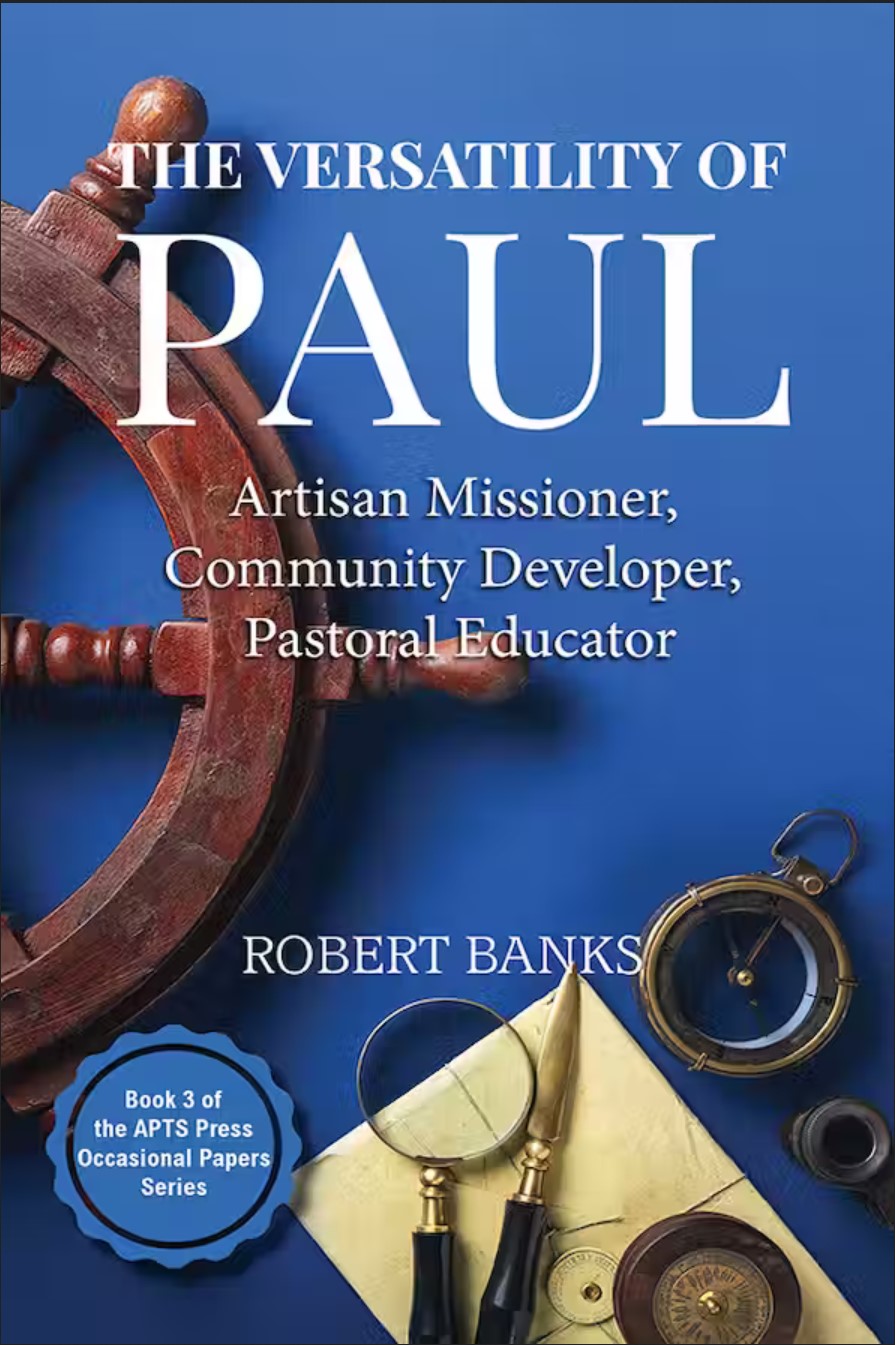Robert Banks: The Versatility of Paul
 Robert Banks, The Versatility of Paul: Artisan Missioner, Community Developer, Pastoral Educator (Baguio City, Philippines: Asia Pacific Theological Seminary Press and Robert Banks, 2022) 132 pages, ISBN 9786218350007.
Robert Banks, The Versatility of Paul: Artisan Missioner, Community Developer, Pastoral Educator (Baguio City, Philippines: Asia Pacific Theological Seminary Press and Robert Banks, 2022) 132 pages, ISBN 9786218350007.
Robert Banks’ ministry experience includes being a professor and an author, he has also lectured at seminaries in various Asian countries (biographical information on the back cover). This book is Volume 3 in the APTS Press Occasional Papers Series (page v). The text is an expanded development of the lectures that the author gave when he presented the William Menzies Annual Lectures at Asia Pacific Theological Seminary in 2021 (page vii). In writing this current volume Banks drew from some of his earlier writings and research (page vii-viii).
As the title of the book indicates its focus is the apostle Paul, in particular, the versatility of the apostle is noted. After the front matter, which includes the Publisher’s Preface, Acknowledgements, a brief entry titled “Paul’s Versatility” by James Stalker D. D., and an Introduction (“Specialist of Generalist?”), the book is composed of 3 parts and a conclusion. Part 1 (pages 5-37) focuses on Paul as an “Artisan Missioner,” Part 2 (pages 39-72) looks at Paul as a “Community Developer.” Part 3 (pages 73-102) is given to a consideration of Paul as a “Pastoral Educator.” Each of these parts is composed of two chapters, the book closes with the Conclusion (pages 103-108).
Part 1, “Artisan Missioner,” consists of Chapters 1 and 2. In these chapters Banks gives attention to what Paul is perhaps best known for: his missionary activities. In Chapter 1, “Cross-Cultural Innovator,” the author writes about the apostle’s efforts to take the gospel to others, to those who had not previously heard, including the Gentiles (pages 11, 7-9). As he pursued this ministry Paul traveled long distances (pages 8-9). Banks points out that Paul’s life and experiences uniquely qualified him for working with different kinds of people (pages 12-13). While he engaged in his Christian ministry, he was not a full-time missionary in our contemporary understanding of the term (page 10). The apostle was not content to just evangelize, Banks notes that he also labored to establish communities of faith, churches (page 9). He gives some attention to Paul’s evangelistic strategy (pages 15-17). The key text for this is Paul’s words in 1 Corinthians 9:19-23 (page 15). It is clear from this passage that the apostle could be versatile, or flexible, as he sought to lead people to a saving knowledge of Jesus Christ. Chapter 1 also includes brief sections on Paul’s pastoral approach (pages 17-18) and personal practice (pages 18-19).
In Chapter 2, “Flexible Response Planner,” the author gives attention to some of the guidance that the apostle received and how he responded to it. He notes that while the Holy Spirit was involved, some of Paul’s movements seem to have been influenced by circumstances and personal relationships (pages 24-27). In this regard too we see that Paul could be flexible.
There is a marked difference between what many of us experience as church today and what the apostolic churches experienced.
Part 2, “Community Developer,” also consists of two chapters, Chapters 3 and 4. In Chapter 3, “Mutual Ministry Advocate,” Banks writes about the community life of the early Christian churches. One aspect of the early Christian communities was their familial dynamic (pages 42-43). Banks, citing Scripture, points out some of the language that is used in the New Testament to describe how believers relate to one another. This language includes words such as “brothers,” “sisters,” “fathers,” and “sons,” the Scriptures referenced in the text, not surprisingly, come from the pen of Paul (pages 42-43). Banks also has a section dealing with a quality that is vital to making the community of believers work, this quality is love (pages 44-46). The remainder of this chapter gives attention to the topics of mutual instruction (pages 46-48), the care of others including their physical and material needs (pages 49-50), and concerns about personal and group welfare (pages 50-53).
Chapter 4, “Distinctive Lifestyle Exemplar,” gives attention to Paul’s dual citizenship, his citizenship on earth and in heaven (pages 55-58). It also takes a look at the apostle’s approach to making decisions about how believers should conduct themselves in this world when confronted with various issues (pages 60-62). Banks, referencing Longenecker, notes that Paul considered some issues “vital” in which case all believers should take one course of action, while others were less critical and offered some measure of freedom so that a believer could take one course of action or another (page 61).
Part 3 looks at Paul as a “Pastoral Educator.” This section is also made up of two chapters, Chapters 5 and 6. Chapter 5 focuses on the apostle as a “Life-Shaped Theologian” (pages 75-89). This chapter basically explores the question of whether theology shapes experience or experience shapes theology (page 75). In the course of the chapter Banks points out that Paul’s experiences had a significant impact on his beliefs.
Chapter 6 gives attention to Paul as a “Learning-Oriented Teacher.” Banks notes that Paul saw a number of different venues as places for teaching and learning, he writes “For Paul, teaching and learning takes place in lecture halls and house churches, in city centers and on road trips, in workplaces and local homes” (page 92). He further notes that this learning can take place in a variety of ways, these include: stories and ideas, conversations and instruction, experience and knowledge, emotions and thoughts, imagination and information, and practice and reflection (pages 92-101).
Paul was both principled and flexible and knew which matters were negotiable and which were not. He was a master at contextualization.
The conclusion of the book is titled “Leader or Servant?” People typically think of Paul as a leader, probably because he was an apostle and because of the work that he did. And he certainly was a leader. However, Banks, referencing Murray J. Harris points out that in Paul’s writings the language of servanthood is pervasive (page 104). Paul’s leadership style was generally not highly authoritarian but more gentle and nurturing.
I think there are two things that are of special note in this book. First, the author’s description of a first-century Christian worship service (page 41). In reading this the contemporary believer can easily see that there is a marked difference between what many of us experience as church today and what the apostolic churches experienced. Second, I found interesting what the author brought out about the complexities of Paul and how he navigated his Christian life and ministry. Paul was both principled and flexible and knew which matters were negotiable and which were not. He was a master at contextualization. The book truly lives up to its title, it is about The Versatility of Paul. I think that serious readers of Scripture will find much to ponder in this volume.
Reviewed by John Lathrop
USA Publisher page: https://wipfandstock.com/9781666773774/versatility-of-paul/
For a sample chapter, go to: https://www.aptspress.org/wp-content/uploads/2022/12/Free-Sample-The-Versatality-of-Paul-2.pdf










Leave a Reply